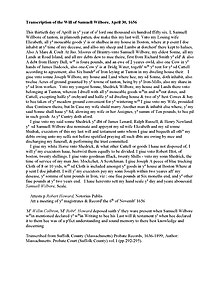
Samuel Wilbore | |
|---|---|
| Born | c. 1595 Sible Hedingham, Essex, England |
| Died | 29 September 1656 |
| Other names | Samuel Wilbur Samuel Wildbore |
| Education | Sufficient to sign documents |
| Occupation(s) | Assessor, constable, sergeant |
| Spouse(s) | Ann Smith Elizabeth (_______) Lechford |
| Children | Samuel, Arthur, William, Joseph, Shadrach |
| Parent(s) | Nicholas Wilbore and Elizabeth Thickines |
Samuel Wilbore (c. 1595–1656) was one of the founding settlers of Portsmouth in the Colony of Rhode Island and Providence Plantations. He emigrated from Essex, England to Boston with his wife and three sons in 1633. He and his wife both joined the Boston church, but a theological controversy began to cause dissension in the church and community in 1636, and Wilbore aligned himself with John Wheelwright and Anne Hutchinson, signing a petition in support of dissident minister Wheelwright. In so doing, he and many others were disarmed and dismissed from the Boston church. In March 1638, he was one of 23 individuals who signed a compact to establish a new government, and this group purchased Aquidneck Island, then known as "Rhode Island", from the Narragansett Indians at the urging of Roger Williams, establishing the settlement of Portsmouth.
Soon after settling in Portsmouth, Wilbore repudiated the petition in support of Wheelwright and was thus permitted to return to the Massachusetts colony. He had returned to Boston by 1645, but he also owned property and resided in Taunton within the Plymouth Colony. He was living in Taunton when he wrote his will in April 1656, but was he living in Boston when he died the following September. His will distributed to his three sons all his land holdings in Boston, Taunton, and Portsmouth. Most of his Rhode Island descendants spell their name Wilbur.